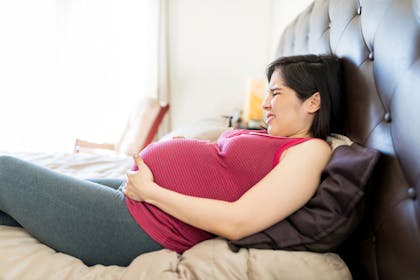Have you heard about Braxton Hicks contractions? Are you unsure about the difference between those and regular labour contractions? Read on to get the lowdown...
This page contains affiliate links, which means we may earn a small amount of money if a reader clicks through and makes a purchase. All our articles and reviews are written independently by the Netmums editorial team.
What are Braxton Hicks contractions?
You may already be familiar with the strange involuntary tightenings in your pregnancy belly known as Braxton Hicks. So what are they, and what causes them?
Well, simply put, they're an indication that your uterus is getting ready for labour. It's a bit like an exercise routine for your womb, that helps to tone the muscles throughout your pregnancy, ready for labour.
Having Braxton Hicks doesn't mean that labour is imminent. Some mums-to-be feel Braxton Hicks contractions from quite early on in pregnancy, while other women become aware of them later on and some never feel them at all (or more likely, just don't notice them).
FREE NEWBORN NAPPIES
These 'practice' contractions were first described by a nineteenth-century British gynaecologist called John Braxton Hicks who studied them in detail, and they're nothing at all to worry about – just another of those little niggles of pregnancy. Having said that, not having them is nothing to worry about either!
It's important to remember that Braxton Hicks are not harmful to you or your baby, so if you begin to feel these early 'false contractions', the best thing to do is relax as much as you can and let them pass.
What do Braxton Hicks feel like?
Braxton Hicks contractions can be uncomfortable but should not be painful. They may feel a bit like a tightening of the stomach that begins at the top of your uterine muscles and spreads downwards.
Some describe them as mild period pains, others, a bit like a stitch.
You'll notice your stomach feels hard and strangely contorted. Once you get closer to your due date, a couple of weeks before perhaps, they will become more frequent and intense.
Here's what mums in our Netmums forum say about their Braxton Hicks:
'Easiest way to describe it was like wearing a corset that was pulled really tightly! I only got them for a couple of days!!'
- Anon
'Braxton hicks aren't really painful they're uncomfortable and a tightness over whole of bump. I can feel and see mine and my uterus goes really tight for 30-60 seconds. Had them loads with first baby and even more this time and they started from 16 weeks'
- Rosie
'Mine were like 'tightenings' at first- my bump used to totally change shape it was really weird! As I got closer to d-day they started getting really really uncomfortable'
- Amy
When do Braxton Hicks contractions start?
Incredibly, there's some evidence to suggest that the womb can start making these little tightenings as early as seven weeks of pregnancy! You won't feel them that early, though.
The earliest most women experience Braxton Hicks contractions is when they're about 16 weeks pregnant. They become more common from 20 weeks, and can continue right up until you have your baby.
Some women say that Braxton Hicks contractions become more uncomfortable towards the end of pregnancy, as the due date draws near.
What is the difference between Braxton Hicks and labour contractions?
The difference between Braxton Hicks contractions and labour contractions feels significant, although if it's your first pregnancy, it’s easy to mistake Braxton Hicks contractions for going into labour as you won't be used to this new experience.
Braxton Hicks should be painless , if a little weird-feeling, and pretty random, whereas labour contractions are most definitely uncomfortable (to say the least) and will be evenly timed and become stronger and more frequent on a fairly relentless basis.
Another main difference between Braxton Hicks contractions and regular contractions, is that Braxton Hicks goes away , while regular contractions get stronger and more frequent.
Changing positions can sometimes help Braxton Hicks contractions to ease off. If you're sitting down, try standing up and vice-versa. Or just give it a few minutes and wait for the contractions to ease on their own.
There's no need to alert the medics if you feel Braxton Hicks contractions happening.
If you feel at all concerned, though, or notice any major change, do mention them to your midwife who can reassure you that the sensations you're feeling are, indeed, Braxton Hicks contractions.
How to ease Braxton Hicks
Some mums-to-be find Braxton Hicks barely noticeable, whereas others find them more intense. They are often triggered by physical activity or dehydration so if pain strikes try the following:
- get plenty of rest, take care of yourself and put your feet up when you can
- if a contraction feels particularly painful, try moving your position, or walking around for a minute or so
- have a warm bath to relax your muscles (not too hot though; overheating isn't good for your baby. If your skin turns pink, the water's probably too hot)
- drink plenty of water to keep hydrated
- try some deep breathing exercises and visualisations, particularly if you've been doing hypnobirthing techniques.
A full bladder can also contribute to Braxton Hicks, since it puts added pressure on your uterus, so make sure you take regular trips to the loo!
When to call the doctor about your Braxton Hicks
Braxton Hicks is perfectly natural and nothing to worry about, so there's usually no need to call your midwife unless you are really concerned. At the very least, they should be able to put your mind at ease.
That being said, if your contractions are increasing in intensity and frequency and are coming at least every five minutes, you may be in labour and will need to go to hospital. Listen to your body and trust your instincts.
In this instance, you should call your doctor or midwife right away, particularly if you aren't yet 37 weeks pregnant and are at risk of a premature delivery .
Always get help from your medical practitioner if you're in a lot of pain or see any kind of unusual vaginal discharge.
This is my first baby – how will I know when I'm in labour?
The time to call the midwife is when you're having strong, regular contractions that:
- last at least 60 seconds
- come every five minutes
Of course, you can always call your midwife for reassurance before this if you're concerned.
Other early signs of labour include:
- backache
- diarrhoea
- feeling or being sick
- lack of appetite
- increased vaginal discharge
- feeling the need to poo
- contractions
- waters breaking
Learn more about the signs and symptoms of early labour.
What to Expect When You're Expecting by Heidi Murkoff is a must-read book for all expectant parents. See more details here at Amazon.
You can also buy it here at Waterstones.
Have you experienced Braxton Hicks prior to giving birth? Why not pop over to the Coffeehouse to share your experiences about Braxton Hicks with other parents:
Related stories
The signs and stages of labour






